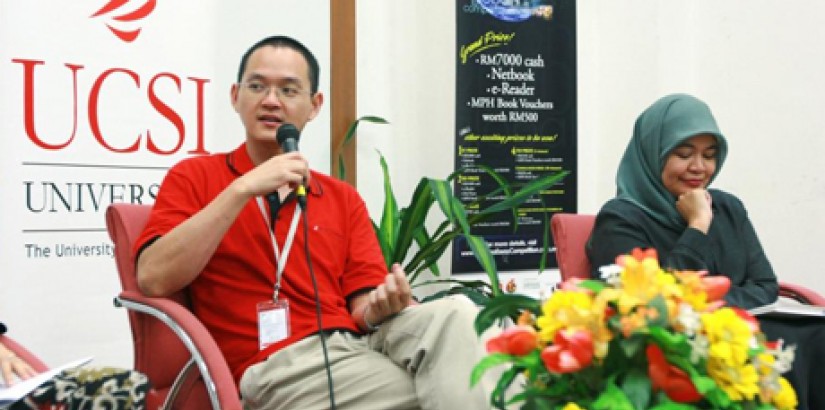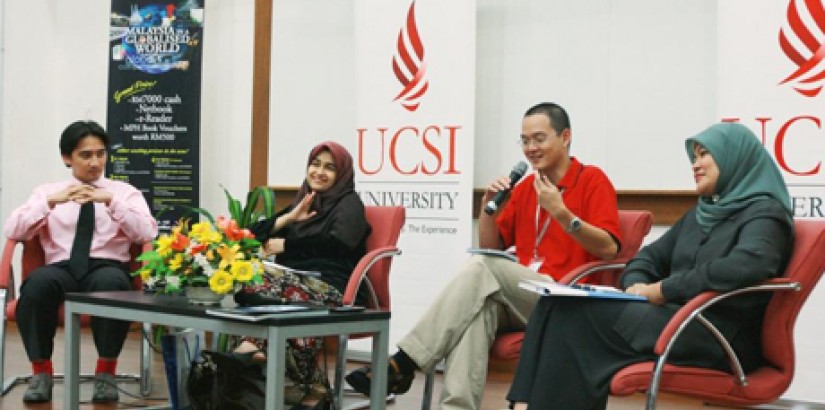2010
12 AugTAPPING THE MINDS OF FUTURE LEADERS
Kuala Lumpur, 12 August 2010 - The promise of an evening of invigorating intellectual discussion was fulfilled on Thursday, 12 August during a forum hosted by UCSI University’s Faculty of Economics and Policy Science where multiculturalism, freedom and intellectualism were the focused themes. Held at UCSI University Kuala Lumpur Campus, the forum entitled “Nurturing the Minds of Future Leaders,” was moderated by Dr. Ong Kian Ming, a lecturer from the Faculty of Economics and Policy Science to highlight how to better prepare today’s youths to take on the challenges of tomorrow as the nation’s leaders and to help them to compete nationally and globally.
This forum was also held in conjunction with the Perdana Leadership Foundation’s essay-writing competition, “Malaysia in a Globalised World”, which is opened to Malaysians between the ages of 18 and 25 to help develop awareness in today’s youths on nation building in preparation for their future leadership. Established in 2003 to support the country’s future developments, the Perdana Leadership Foundation, aims to provide Malaysian youths insight on the contributions of the nation’s leaders by showcasing the history and work of Malaysia’s previous prime ministers.
The panellists for the forum were Zarina Nalla, policy and project development consultant with the International Institute of Advanced Islamic Studies, Wan Mohamed Firdaus Wan Mohamed Fuad, director of the Institute for Democracy and Economic Affairs (IDEAS) and Zarina Abu Bakar, general manager of the Perdana Leadership Foundation.
Zarina Nalla believes that children need more interaction and exposure to other races from a young age to inculcate a more tolerant way of thinking for leadership requires an appreciation and understanding of other cultures.
“(A child) needs to live the experience, and she won’t have the experience if she is in her comfort zone all the time,” she said. “You need to see and hear the other and see them as your own. We are all part of one society.”
Malaysian children, she said, are often separated by race during primary school, making it difficult for them to overcome stereotypes. Likewise, she feels that Malaysian youths are often exposed to racial stereotypes and power plays from a young age, which leads them to similar thinking as adults.
Thus, Zarina Nalla reiterated, “The concept of equal citizenship can be taught to a 7-year-old”.
Wan Mohamed Firdaus felt that the problem with Malaysian society today is its lack of encouragement for natural born leaders to assume leadership roles. Specifically, he said those who are smart and would make the best leaders are encouraged to enter into medicine or law instead of politics, thereby leaving important government decisions to those who may not be as well-qualified.
This, according to Wan Mohamed Firdaus is related to today’s youths lacking the freedom to make their own decisions regarding their future and their restraint in challenging family pressure to enter into a specific field. He said young people need the ability to make these decisions from young to prepare them for the more difficult future decisions – decisions which normally fall on the shoulders of leaders. He was also critical of the Malaysian media because Malaysian youths, he said, also need exposure to more analytical and informative newspapers and other media sources – such as those in the United Kingdom – to be effective leaders.
Zarina Abu Bakar was of the opinion that today’s youths need to be more politically engaged in order to become better leaders.
“I think responsible leadership starts from being responsible citizens,” she said. “To become leaders of the future we have to start by being aware of current concerns.”
Zarina Abu Bakar then spoke about Vision 2020 - Malaysia’s goal to create a fully-developed economy and unified society within the next decade – and the need to develop a knowledge-based economy to achieve it. Thus, she felt today’s youths need to develop their knowledge base and be aware of current events, thinking about them critically and to vote. For this, Malaysia, she said, needs to develop a culture that encourages intellectual freedom, creativity and innovation.
The forum became more interactive when the students in the audience shared their own ideas what they needed to become better leaders. They also echoed many of the panellists’ concerns for more freedom to voice their opinions and to make mistakes, without fear of family condemnation.
UCSI University biotechnology student Ngizan Nomishan who agreed that students need the ability to make their own decisions said, “My parents wanted me to study medicine, but I chose biotech”.
Fang Hong, who studies business administration at UCSI University, and who learns from the ideas of others agreed, “I think leadership is important”.
Although the forum ended around 7.30pm in honour of breaking fast, the stimulating discussion continued on to the dinner table for many of its audience and the three panellists.
UCSI students who have a flair for writing are encouraged to take part in the essay competition organised by the Perdana Leadership Foundation by submitting their entry before 30 September. More information could be obtained from www.PerdanaEssayCompetition.com.my.









